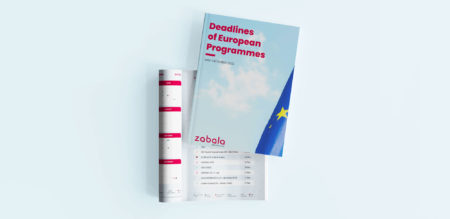This website uses cookies so that we can provide you with the best user experience possible. Cookie information is stored in your browser and performs functions such as recognising you when you return to our website and helping our team to understand which sections of the website you find most interesting and useful.
Horizon Europe: Political agreement increases the budget to €95.5 billion
The European Parliament and the Council reach a political agreement on Horizon Europe, the EU's largest transnational programme, supporting research and innovation. Its budget will increase by 30% compared to that of the current research and innovation programme, Horizon 2020.

The European Commission has welcomed the political agreement between the European Parliament and the Council on Horizon Europe, the largest transnational programme in support of research and innovation. The new EU research and innovation programme will have a budget of around €95.5 billion for the period 2021-2027. This includes €5.4 billion from NextGenerationEU to boost recovery and increase the EU’s resilience in the future, as well as a further €4.5 billion reinforcement. In total, this represents a 30% increase over the current research and innovation programme, Horizon 2020, and makes Horizon Europe the most ambitious research and innovation programme in the world.
The new Horizon on three pillars
Horizon Europe will promote excellence and provide valuable support to the best researchers and innovators to drive the systemic changes needed to ensure a green, healthy and resilient Europe:

Horizon Europe will promote scientific excellence through the European Research Council (ERC), The Marie Skłodowska-Curie fellowships and exchanges and the specific research of the Joint Research Centre, the Commission’s service for science and knowledge.
The programme will support collaborative research on societal challenges and strengthen technological and industrial capacities through thematic clusters addressing the full spectrum of global challenges.
Thematic clusters
Horizon Europe’s Climate Energy and Mobility cluster and the Digital Industry and Space cluster will expand research and innovation resources in climate-related areas and ensure that European businesses have access to the technologies and data they need. In this area, priority will be given to quantum research to strengthen Europe’s scientific leadership and excellence in quantum technologies.
The cluster Culture, Creativity and Inclusive Society has been strengthened, supporting research and innovation in the cultural and creative sectors, as well as in the field of cultural heritage, through building cultural heritage collaborative space, as well as in humanities and arts.
In addition, the Health cluster will address challenges such as the coronavirus pandemic, the expansion of clinical trials, innovation in protective measures, virology, vaccines, treatments and diagnostics, as well as the translation of research results into public health policy measures.
Missions, objectives 2030
The EU’s missions will address issues that affect our daily lives and will range from fighting cancer to adapting to climate change, the green transformation of cities, the health of the soil, food, nature, people and the climate, as well as protecting our waters and oceans. The European missions will focus on ambitious, achievable and time-bound targets to promote European common goods. Its objectives for 2030 are to reach:
- 3 million lives saved from cancer
- one hundred climate-neutral cities
- healthy oceans, seas and inland waters
- healthy soils and food and climate change-resistant regions.
The streamlining of the number of European partnerships, which will cover critical areas such as energy, transport, biodiversity, health, food and circularity, will encourage a broad involvement of public and private sector partners.
Innovation Ecosystems
Europe’s innovation ecosystems will be enhanced by bringing together regional and national innovation actors:
Horizon Europe will encourage participation, reduce the research and innovation gap and strengthen the European Research Area (ERA) through a wide range of measures aimed at supporting countries with lower research and innovation performance, creating centres of excellence, improving their capacity and facilitating collaborative links. These measures will receive 3.3% of the programme’s budget, a significant increase compared to Horizon 2020.
In addition, the programme will introduce new elements, such as the European Innovation Council (EIC), which is already in a pilot phase, will have a budget of around €10 billion to support new and cutting-edge innovations by SMEs, start-ups and mid-cap companies. It will also complement the European Institute of Innovation and Technology (EIT).
Collaboration with other programmes and policies
Horizon Europe will increase its impact by working closely with other EU programmes and policies – such as InvestEU, Erasmus+, EU Cohesion Policy, Digital Europe, European Structural and Investment Funds, Connecting Europe Facility, and the Recovery and Resilience Facility – to promote faster dissemination and uptake of research and innovation results at a national and regional level.
For the first time in the history of the Framework Programme, regions will be able to voluntarily transfer part of their regional funds to Horizon Europe to be spent on research and innovation activities in their region.
In addition, the Commission has proposed to exempt SME projects that have been awarded a ‘Seal of Excellence’ under Horizon Europe from the notification obligation for state aid in order to further facilitate the support procedure. This is possible thanks to the safeguards already present in the EU programmes managed centrally by the Commission.
Next steps
The political agreement has been formally approved by the European Parliament and the Council. Since the interim agreement of March 2019, the Commission has been preparing the implementation of Horizon Europe in order to launch the programme as soon as possible in 2021. The Commission estimates researchers could see the first calls for grant applications by April.
DOWNLOAD THE FACTSHEET ABOUT HORIZON EUROPE
Source: the EC and Science Business



